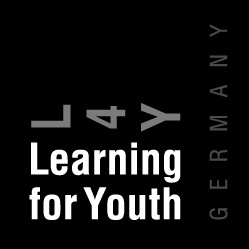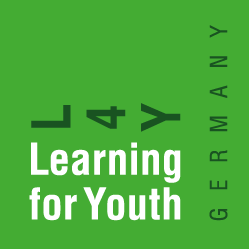Partner Identification Form
L4Y
We have two PIFs for KA220 and KA210 projects, below
Partner Identification form (PIF)
| OID |
E10018104 |
| Full legal name |
L4Y Learning For Youth GmbH |
| Country | Germany |
| Postcode | 66111 |
| City | Saarbrücken |
| Website | https://learningforyouth.com |
| info@learningforyouth.com | |
| Phone | +49 1511 967 1336 |
Legal representative
| Title |
Mr. |
| Family name |
Ateş |
| First name | Ahmet |
| Position | President |
| info@learningforyouth.com | |
| Telephone | +49 1511 967 1336 |
Contact person
| Title |
Mr. |
| Family name |
Wibisono |
| First name | Ibnu Angga |
| Position | Project coordinator |
| learningforyouth@gmail.com | |
| Telephone | +49 1517 217 0440 |
KA220 PIF – Environmental Protection and Youth – Partner Identification Form (Youth-Adult)
| Type of the organisation |
| SME |
| Has the organisation received any type of accreditation before submitting this application? |
| No |
| Please briefly present the organisation/group (e.g., its type, scope of work, areas of activity, and if applicable, the approximate number of paid/unpaid staff, learners, and members of the group) |
|
L4Y Learning For Youth is a forward-thinking art and technology enterprise established in 2018 in Pirmasens, Germany. Our mission is to equip young people with cutting-edge skills in quantum technologies, blockchain, digital art, and AI, empowering them for successful careers in an evolving digital landscape. We are also committed to social impact, focusing on integrating refugees, asylum seekers, and immigrants while promoting environmental sustainability. By pioneering digital creativity and sustainable practices, L4Y enhances employability, inclusivity, and ethical technology, ensuring a brighter future for all. With a dedicated team of three, we deliver innovative educational programs and Erasmus+ projects, addressing the needs of youth and VET trainees. L4Y is a trusted partner in fostering digital transformation and nurturing the next generation of tech-savvy professionals prepared to impact society and the environment positively. Areas of interest; Team Working, Creative/Critical Thinking, Art ( Redbubble: https://rdbl.co/3n3jfta Zazzle: https://bit.ly/ 3BPqACR ), Smart Villages, Smart Cities, Smart Farming, Smart Husbandary, Civil Protection, (Social) Entrepreneurship, Learning efficiency, Digital skills, Emerging Technologies (Quantum, blockchain, AI) We are experts in; SEO-friendly website design, Visual Design, and LMS Design. Our primary target group is young people and VET trainees; we also work with adults and migrant background people. |
| What are the activities and experiences of the organisation in the areas relevant to this project? What are the skills and/or expertise of key persons involved in this project? |
|
Youth Projects Youth1 – Youth Participation For Developing Sustainable GreenCities (2022-1-DE04-KA220-YOU-000085135) The project aims to foster collaboration between cities and youth to enhance urban sustainability by establishing a network of self-sufficient, youth-led NGOs in partner cities and raising awareness among young and also adult citizens about the importance and potential of creating their own innovative, green cities. Activities Youth2 – Code For Future (2022-3-DE04-KA210-YOU-000092666) The project is focused on creating a transformative impact on young students and shaping the tech industry’s future. Key objectives include providing businesses with highly sought-after human resources and guiding students along their coding career paths. Additionally, the project aims to address the world’s rapidly growing demand for coders by raising awareness among young people about planning their careers as coders. It also strives to build a sustainable community supported through training, guidance, and networking opportunities. Activities The project undertakes impactful activities, starting with 45 student interviews and 9 expert interviews to shape a training structure and a 30-page guideline for youth workers, teachers, and also guidance counsellors. It also establishes an Online Community, organizes 3 local writing contests, and hosts Career Days in Adana and Cologne. Youth3 – Your Time-wasting Life on Social Media and its Business Opportunities Inside (2023-1-PL01-KA210-YOU-000159357) This project aims to educate young people about the business opportunities available through social media platforms, helping them develop the necessary skills and competencies to succeed in the modern workplace. Additionally, it seeks to raise awareness about the negative impact of phone addiction, providing tools and strategies for managing social media use healthily and productively. Ultimately, the project also empowers young people to become successful social media entrepreneurs. Activities The project includes Pilot-Testing and Workshops to refine social media entrepreneurship approaches, followed by Local Training to equip youth with relevant skills. A Youth Contest encourages participants to apply their knowledge creatively, while 45 interviews provide insights that inform a comprehensive Country Report on the project’s impact. Youth4 – Local Europeanisation of Youth Through New Communication Tools (2022-1-DE04-KA210-YOU-000081406) The main goal of the NETYOUTH Erasmus Project is to bridge the communication gap between young Europeans and local entities. Using social media and creative communication channels, NETYOUTH aims to empower young people and connect them with European values. Moreover, this involves understanding how young people communicate and what they talk about. Social networks powerfully shape their communication style, and consequently, their messages reflect their values. Therefore, NETYOUTH finds the best ways to engage young people with European values. Activities Additionally, the project includes a training course for representatives of local institutions. This course promotes youth participation in local social networks and reinforces European values. Through this training, local representatives will learn practical ways to engage with youth and encourage their involvement in community activities and European initiatives. VET Projects The DigiMark project aims to develop an innovative methodology empowering young artists, including VET trainees and students. This idea is to adapt to online digital marketing to promote and sell their art. The project aims to equip young artists with digital marketing skills and align vocational education with market needs. It also focuses on training in AI tools and enhancing their understanding of digital marketing strategies and regulations across countries. Activities The DigiMark project is structured around four main activities: Project Management to ensure smooth coordination, Curriculum Development to equip young artists with digital marketing skills, Content Creation and Community Channel to foster knowledge sharing, and also Dissemination to promote the project’s outcomes to a broader audience. These activities are integral to achieving the project’s goals and significantly impacting young artists. VET2 – Introduction to Enterprise Resource Planning (ERP) Software for VET teachers (2023-1-DE02-KA210-VET-0001506) The primary aim of this project is to address the growing demand for ERP software operators and programmers by training VET trainers, enhancing their skills and knowledge in ERP software, and encouraging the integration of ERP into vocational education curricula. Ultimately, this initiative seeks to improve the employability of VET trainees by equipping them with relevant, in-demand skills. Activities The main activities of this project are structured across four key work packages (WPs). WP1, led by Xient, focuses on the coordination and management of the project. WP2, managed by L4Y, involves developing the training structure and content for ERP software education. WP3, also coordinated by Xient, covers the Köln Mobility initiative, facilitating hands-on learning experiences. Finally, WP4, overseen by L4Y, ensures sustainable dissemination and communication of the project’s outcomes and findings. VET3 – V2B: Creating NFT Opportunities on Metaverse for Art VET Trainees The MetaNFT project aims to tackle challenges related to non-fungible tokens (NFTs) and revolutionize their use. Its goals include creating the MetaNFT Project Mapping Manual and training VET trainees in Metaverse NFT creation to boost their employability. The project also aims to help VET providers incorporate these skills into their curricula while enhancing trainees’ digital marketing abilities. Activities ADU Projects With the UN emphasizing the need to double world food production by 2050, the GrandFriend project is designed to address the challenges associated with this goal by involving both older and younger generations in the agricultural sector. The project aims to highlight the benefits of Intergenerational Programs in sustainable agriculture and promote active citizenship among former agro-entrepreneurs. It aims to boost youth engagement in sustainable agriculture and also address generational challenges in the sector. Activities As part of the GrandFriend project, target groups will engage in several key activities to enhance intergenerational collaboration in agriculture. In WP2, participants participate in interviews and online discussions to identify the need for integrating Intergenerational Programs into Adult Education. WP3 will involve national testing sessions with at least eight participants. These participants will also provide feedback on the mechanics, scenarios, content, and design of the GrandFriend Digital Game. Finally, in WP4, participants will join Local Lessons Sessions and AgroLabs. In these sessions, 28 participants will test the Practical Learning Module and receive mentorship to develop their business plans. ADU2 – Training for self-protection against forest fires in rural areas (2021-1-DE02-KA220-ADU-000028430) Firstly, we have done surveys with rural area people and experts to create the training program and content for the training platform and we are currently looking for NGOs, Associations, schools, foundations, and volunteering organisations kind of stakeholders who can use our training to train their members, students, and volunteers. We are doing a protocol (English version and German Version) with them, but you are not responsible as an organisation. Also, with one of the stakeholders, we will organise a pilot test with ten people without digital skills and ten people with digital skills.
|

CONTACT INFO
In den Tannen 2 – 66953 Pirmasens / Germany
Phone: +49 1511 967 1336
Email: info@learningforyouth.com
Web: https://learningforyouth.com
This site is designed by L4Y Learning For Youth GmbH and hosted by Fastcomet
